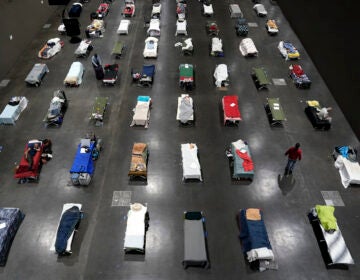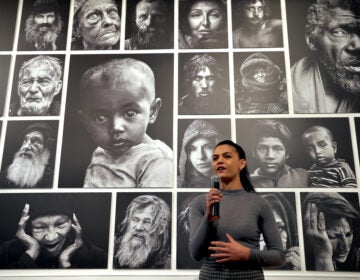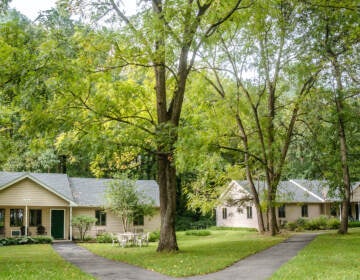Philly launched a program to put homeless people to work. Here’s what happened.
The Same Day Work program — developed by Mural Arts with the Scattergood Foundation and MHP, and funded by private philanthropy — is eight weeks into a two-year pilot.
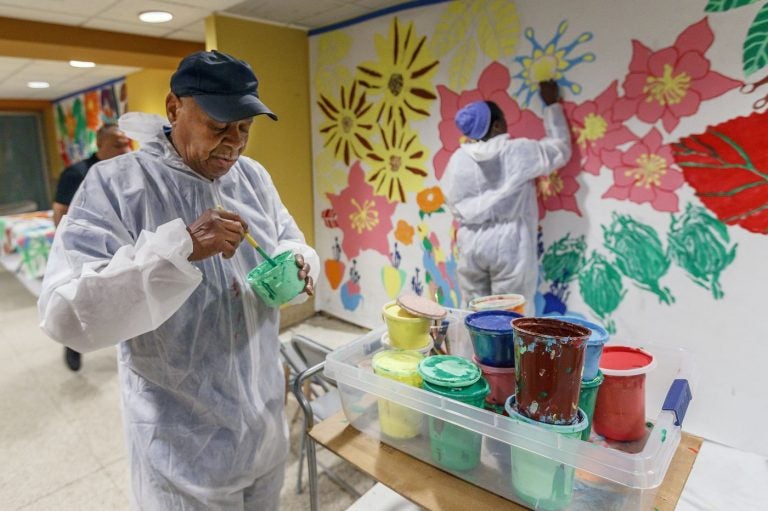
Tyrone Webb stirs green paint in a small room in Suburban Station. He's painting as part of the Same Day Work program. (Michael Bryant/Philadelphia Inquirer)
This story originally appeared on The Philadelphia Inquirer.
As a Monday morning rain rinsed LOVE Park and chased early commuters into their offices, 34 people gathered by the LOVE sculpture and waited impatiently for a lottery to begin.
Roberto Valdez, an outreach worker from Mental Health Partnerships (MHP), read out the numbers, and wide grins broke out. There was a little impromptu dancing. A grown man jumped up and down.
Then, as the unlucky majority shuffled away — some grumbling theories about a rigged system — the 10 winners filed into Suburban Station to claim their reward: a morning’s work with Mural Arts Philadelphia and, at the end of it, a payday.
Brigette Felix, 49, said it was a valuable opportunity to work her way out of a bout of homelessness that has stranded her in a West Philadelphia women’s shelter for close to a month, and a temporary reprieve from the reality of her situation.
“When I got down here, it was a wall of beauty,” Felix said. “I wanted to put my beauty on the wall, too.”
The Same Day Work program — developed by Mural Arts with the Scattergood Foundation and MHP, and funded by private philanthropy — is eight weeks into a two-year pilot. Already, demand is far outpacing the slots available, and the city is looking to match the endeavor with more jobs, though plans remain tentative.
“It’s not that complicated. People want to work,” Scattergood’s Samantha Matlin said. “It was really just figuring out the logistics to make that happen.”
Those hurdles included recruitment — how to reach those with the greatest needs, without creating one more too-scarce resource. (As the lottery crowds are growing into the dozens, organizers are debating whether there’s something they can offer those who aren’t picked: socks, or a gift card for coffee, perhaps.) Another challenge was deciding who would assume the liability and risk of handing out the $50 cash payments every day; Matlin finally stepped up, designing a brief survey that’s administered as participants pick up their checks.
But the crowds at LOVE Park each morning, she said, are quickly proving the point of this pilot: “The goal is by showing the desire and the readiness for this work, others will step up with jobs.”
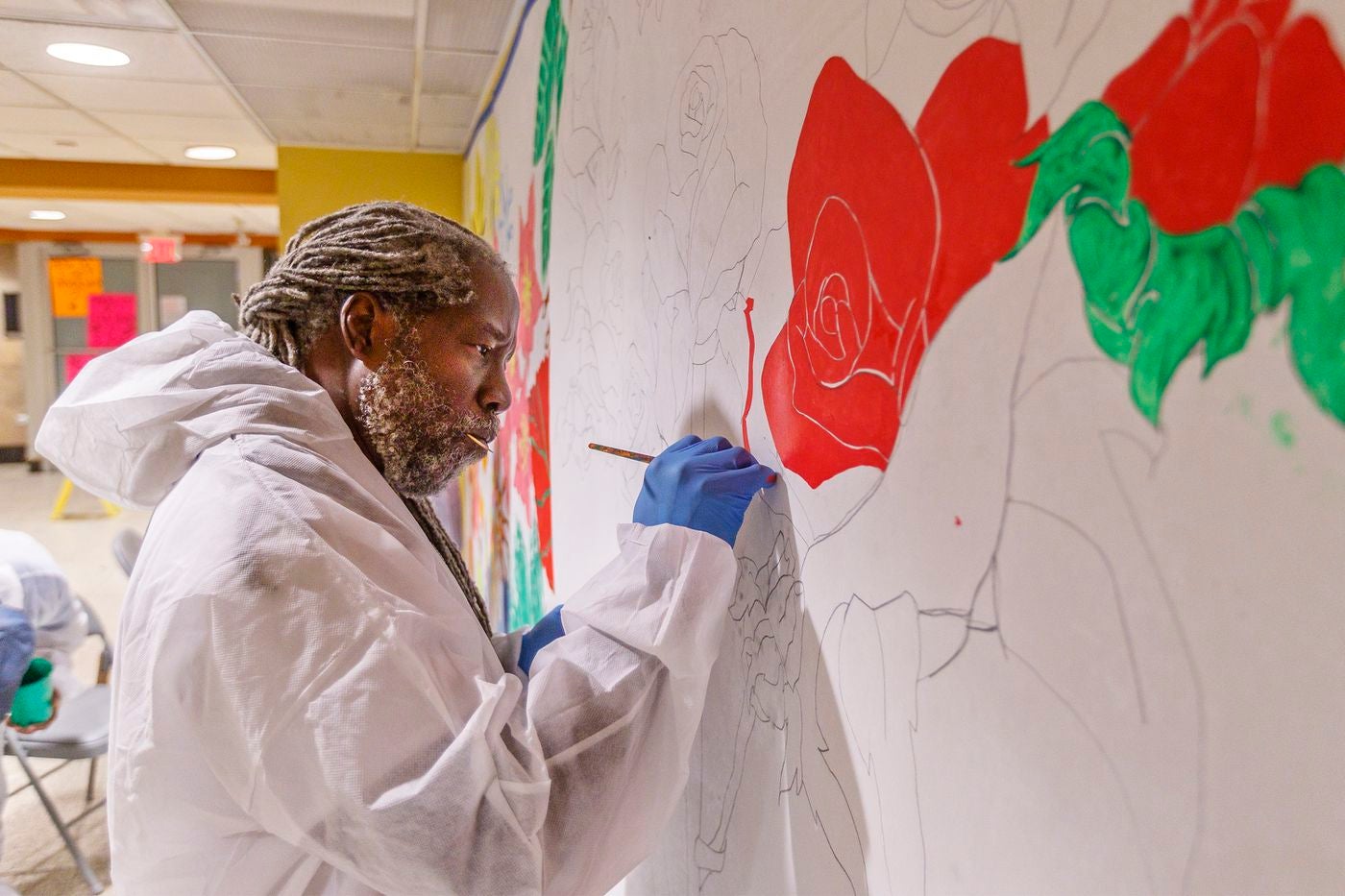
Similar programs have sprung up around the country as a way of reducing panhandling — often in cities, like Albuquerque, N.M., where laws criminalizing it were defeated in court.
Philadelphia Office of Homeless Services director Liz Hersh said the city intends to jump aboard at a “modest” scale in the next few months, with a goal of matching the jobs Mural Arts has created.
“We very much want to use their infrastructure and make it more sustainable,” she said.
While additional jobs, like those in other day-work programs, might involve more manual labor, for now Mural Arts’ approach with its same-day art-making program, called Color Me Back, is a gentler one. Participants spend the three-hour shift drawing and painting in a studio, the shell of a former Au Bon Pain in the concourse. Later, they will begin work on a mural along one of the underground corridors beneath 16th Street and John F. Kennedy Boulevard.
Over a backing track of classical music (a violinist, playing for tips, was just outside the window), Emily Crane of Mural Arts read from a long list of rules: no drugs, no guns, no sleeping. If you need to use the bathroom, use the public one; don’t even try to go to the area reserved for ticketed passengers.
Teaching artist Alvin Tull, who was himself once homeless and in addiction, then stepped up with a lecture, more pep talk than instruction.
“This gives you the opportunity to express yourself, and guess what? Can’t nobody say anything,” he told them, inviting them to make name tags, to color in photocopied line drawings, or to draw flowers like the ones lining the walls. The floral theme is intentional. “Everything starts from a seed,” he said, “so we ask that you just take your time.”
Though most participants are homeless, no two took the same path here.
Aaron Brooks, 27, said he just completed an architecture program at Community College of Philadelphia, but recently wound up on a steam grate near the Barnes Foundation. A black gym bag at his feet contained neatly folded blankets and a sketchbook full of designs for churches and rec centers, with religious scrawlings in the margins.
“Somebody told me I could go sell my blood. It was like $40,” he said. “Maybe if it gets real, I’ll do that. But being as though I knew about this, that wasn’t my first thing to go to.”
Felix said she works close to full-time for a cleaning company, but still could not maintain her housing. “I lost everything. But it’s written in the Bible that everything I lost, God will give it back to me, so I got to be positive,” she said.
Hassan Butler, 40, also works. With two under-the-table jobs delivering circulars, he can afford a room in a boarding house. He and a friend now also enter the Same Day Work lottery every morning: “If he gets picked, he’ll break me off half, and if I get picked I’ll break him off half.”
Most are not working, though, and some struggle with mental illness or addiction. One man, James Lowery, said he had recently come home from prison and opted to live on the street rather than move back in with his mother at age 42. Tull doesn’t push any of them — allowing them to color for three hours if they want, or to get up and paint along the wall.
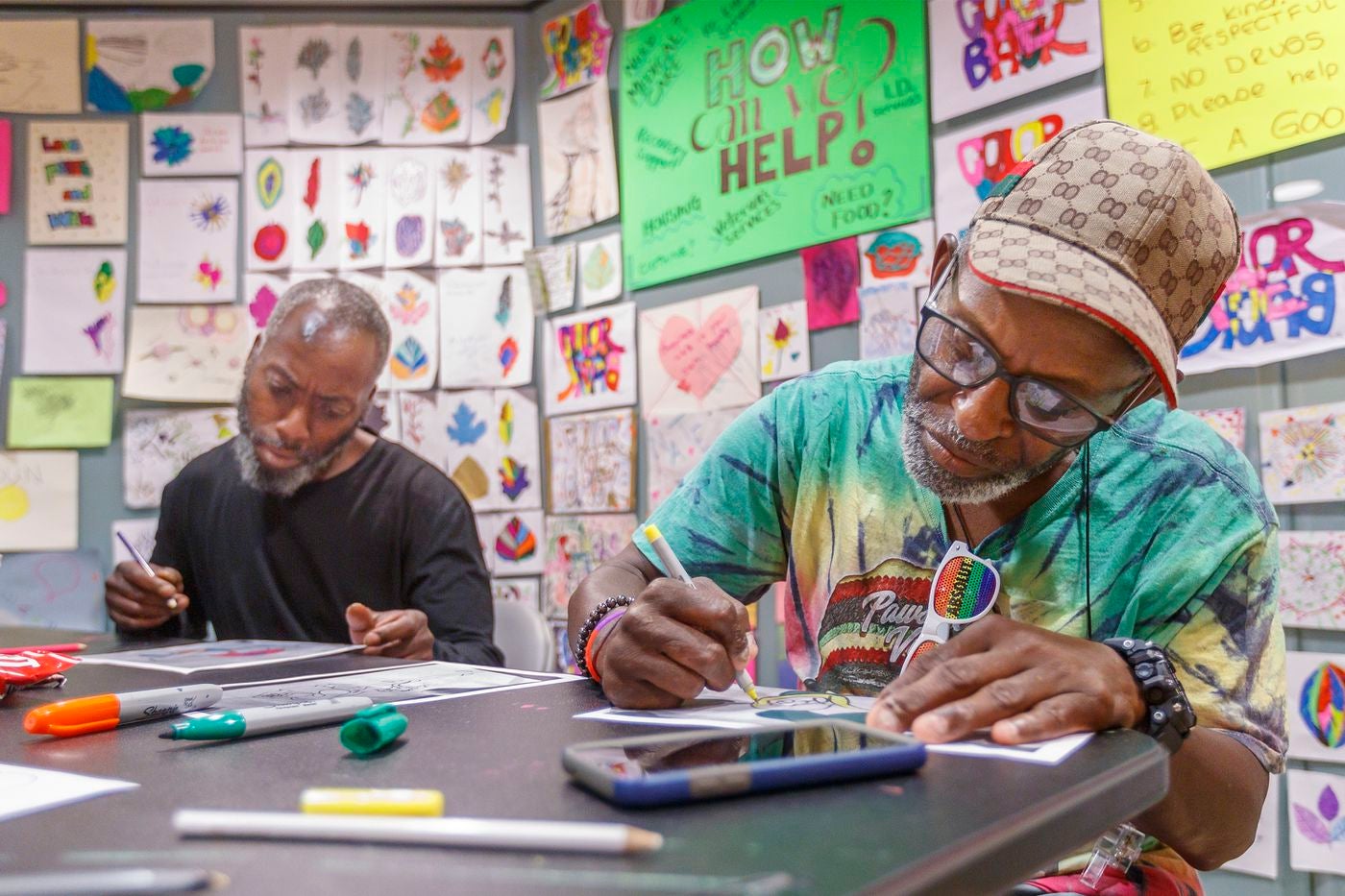
Adyna Black, 33, was carefully dabbing blue paint onto flowers on parachute cloth taped to the wall. She said she’s been clean for more than five months, and is trying to get a few hundred dollars to get back into housing. But her options are slim: win the day-work lottery, sell her meager food stamps, or buy candy to sell on the street.
“I try to find other ways,” she said. “Something without dealing with the cops.” She doesn’t have a bank account, so if she gets money, she’ll store it on a 7-Eleven credit card.
The organizers linked some of the workers to First Step Staffing, a nonprofit agency that provides training and supportive services to its workers, and referred others to Adam Bruckner, who each Monday stands on the Parkway writing dozens of checks to PennDot to cover fees for photo IDs that are prerequisites to joining the workforce. (Philadelphia launched a municipal ID program in March to address this need, but it was almost immediately backlogged, according to reports. Currently, the earliest appointment available online is Sept. 6.)
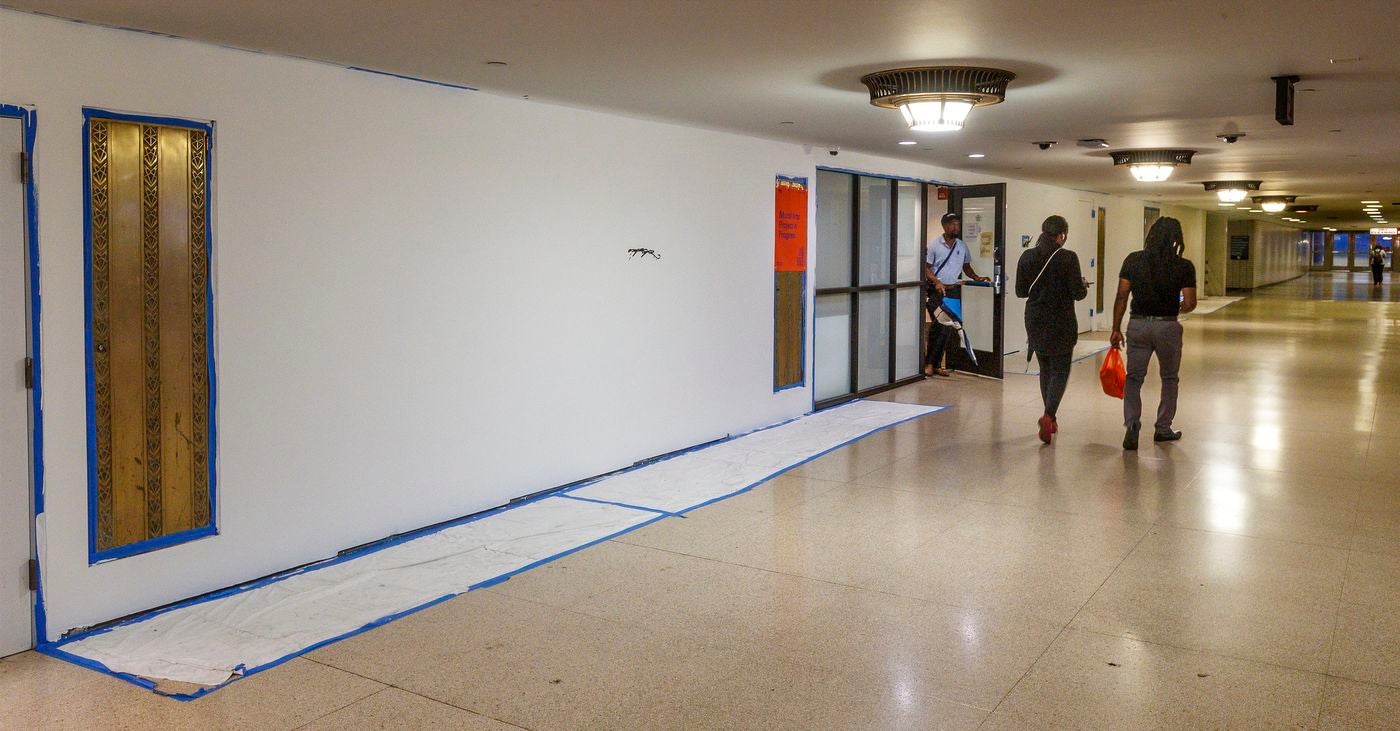
Several participants said that even if they don’t take a referral, just being in this calm space and concentrating on something positive feels restorative.
“I seen people up there, they’re very angry. They come down here, they’re a totally different person — very peaceful,” Valdez said. “Often, when they’re angry it’s a defense mechanism.”
Norman Muhammad, 58, was quietly coloring in drawings of roses and contemplating his path in life, which has always seemed to lead to prison or onto the streets.
This program, he said, “gives you a chance to concentrate and be alone so you can think. Because once you walk out that door, all hell starts all over again.”
 Philadelphia Media Network is one of 21 news organizations producing Broke in Philly, a collaborative reporting project on solutions to poverty and the city’s push toward economic justice. See all of our reporting at <brokeinphilly.org.
Philadelphia Media Network is one of 21 news organizations producing Broke in Philly, a collaborative reporting project on solutions to poverty and the city’s push toward economic justice. See all of our reporting at <brokeinphilly.org.
WHYY is your source for fact-based, in-depth journalism and information. As a nonprofit organization, we rely on financial support from readers like you. Please give today.


